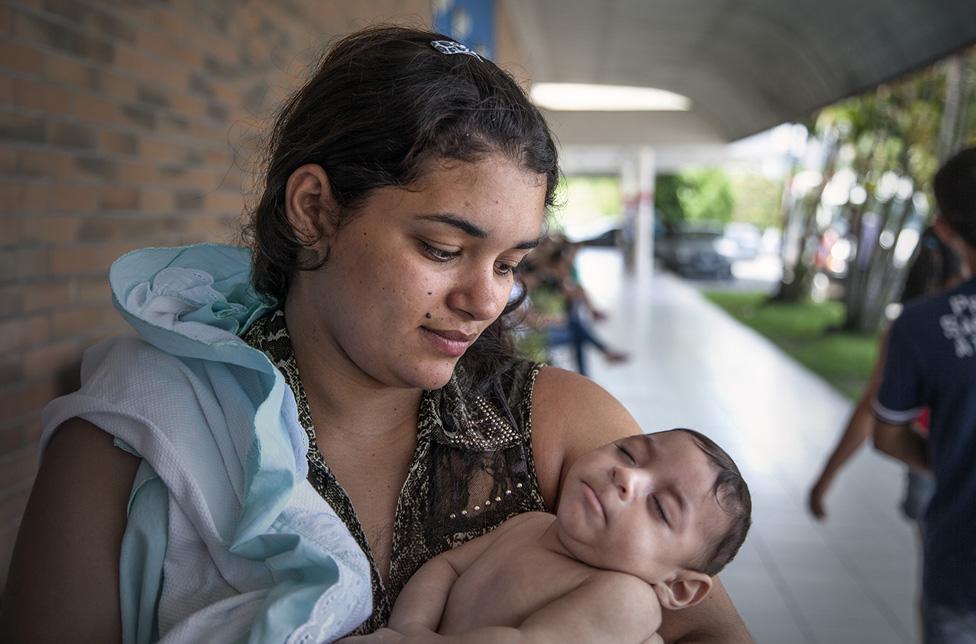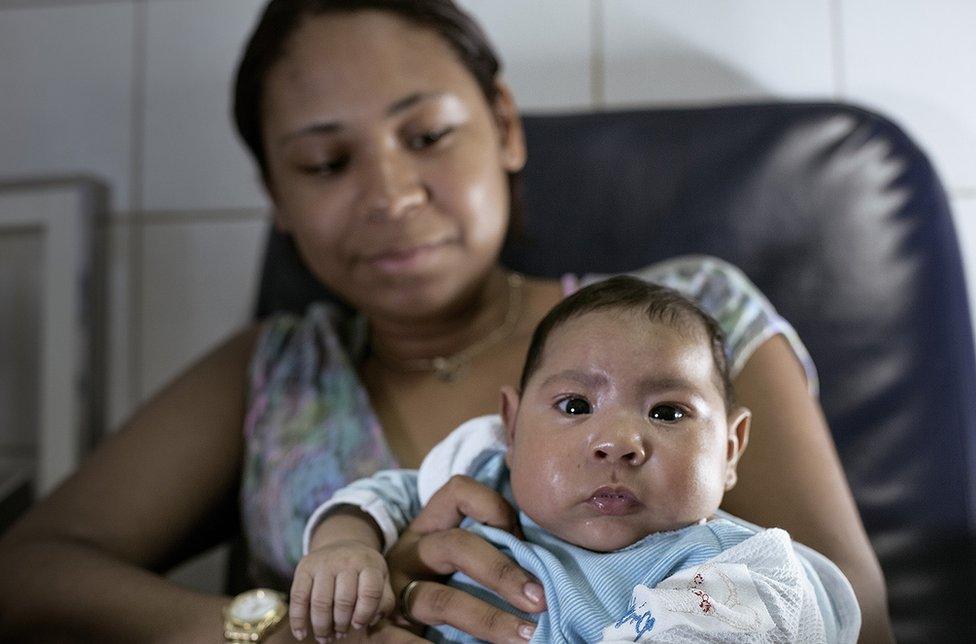Having a baby in the Zika capital
- Published

More than 1,400 babies with microcephaly have been registered in and around Recife, in north-eastern Brazil. For parents it's hard to come to terms with the implications, and for pregnant women a cause of huge anxiety.
Juliana Candido
It's bath time for baby Enzo Candido Freitas - in a blue plastic tub on the kitchen table. His mother, Juliana, tenderly wraps her six-week-old baby in a towel as Jobson, his father, hands her a nappy.
It seems like a normal happy domestic scene but I can see that Enzo is not a normal baby. His head is abnormally small, he is likely to be brain-damaged. His eyesight is also affected and his little legs are displaced.
Enzo has microcephaly - an underdeveloped brain. Recife, capital of Pernambuco state in the north-east, has become in effect the Zika capital of Brazil.
The story of six-week-old Enzo - a suspected Zika baby
The Zika virus, carried by a mosquito, is suspected of being the cause of an explosion in cases of microcephaly here.
Juliana and Jobson play with Enzo on the bed before putting him into his cot. As Juliana kisses his feet she tells me, "He will be my comfort and joy on sad days, my eternal baby."
She knows her baby has brain damage but her husband refuses to acknowledge it. "Maybe not for others but for me he's going to be a normal kid - he's going to study and do everything a normal child does," insists Jobson.
I go with Enzo and his parents to meet the doctor who was the first to realise that something out of the ordinary was happening in Recife. Dr Vanessa van der Linden examines Enzo and gently explains to his parents that he has the classic symptoms of microcephaly.

Find out more
Panorama: The Zika Baby Crisis is broadcast on Monday 7 March at 20:30. You can catch up after broadcast via the BBC iPlayer.

Van der Linden started seeing more and more babies with abnormally small heads last autumn - three in one day in one hospital, when before there had only been a handful of cases each year in the city. The babies had unusual scarring of the brain, as the doctor showed me on a CAT scan. "There was something different about these cases, probably a new pathological agent or a new disease," she says.
That new pathological agent seems almost certainly to be the Zika virus. The theory is that it somehow crossed from some pregnant mothers, who had been bitten by a mosquito, into some babies in the womb - causing microcephaly.
As the doctor manipulates Enzo's limbs and tests his reflexes, Juliana becomes more distraught and breaks down in tears. "He is not going to be like other kids," she says, "but I hope he will progress day by day and we will strive for that together - myself, my husband and my son."
Jobson comforts his wife. "I will always love Enzo," he says. "He's my son and I've got to love him."

Adenilda Lima
Adenilda is pregnant and lives in Recife at the heart of the Zika crisis
I went with health workers to visit one of 400 pregnant women in a study of mothers-to-be who have been bitten by a mosquito carrying the Zika virus and then developed a tell-tale rash.
Adenilda Lima is apprehensive as a sample of her blood is taken and she is questioned about the redness she had on her arms and legs.
Doctors suspect that being bitten and developing the rash in the first three months of the pregnancy is the riskiest time. Adenilda shows me pictures of her ultrasound scans which indicate she is in the clear but she will not know for certain until the baby is born.
Adenilda already has two children and she cries as she tells me what having a disabled baby would mean to the family.
"Having a child born with microcephaly - it would be so painful… something completely beyond my experience," she says. "It would be very hard for me - and for every mother."
The study is being run by Prof Laura Rodrigues from the London School of Hygiene and Tropical Medicine who is heading a research group into the microcephaly epidemic at Fiocruz Research Centre in Recife.
"This is important because women at the moment, if they are pregnant and they get Zika, they don't know if the risk to their babies is 5% or 95%," she says.
"The results of this research will be useful for the rest of the world."
Rodrigues warns that there has been a big increase in the number of women developing the rash - and not all people infected with the Zika virus get the rash, some have no symptoms at all.
"What is happening now is the second epidemic of Zika which will be followed by a second outbreak of microcephaly in eight to nine months," she says. "We think there will be a whole new spike in cases of microcephaly."
Through her tears, Adenilda tells me she decided to take part survey because it is important for every woman to help the scientists understand the effects of the Zika virus, and prevent more women having babies with microcephaly.

Edernalia da Silva

Across town in the sprawling and ramshackle Oswaldo Cruz public hospital the waiting room is crowded with mothers carrying tiny infants - all with the telltale small heads.
Dr Regina Coeli, a paediatrician invites me into her consulting room to meet baby Christian da Silva, Edernalia, his 18-year-old mother and his grandmother, Damiana.
Coeli wraps the tape measure round Christian's head explaining that its circumference is only 32cm, which is too small for a baby his age. Christian has microcephaly but it is too early to tell how badly he will be affected.
Edernalia didn't even know she had been bitten by a mosquito and contracted the Zika virus - she had no symptoms. I sit with her as she cradles Christian and feeds him. "He won't be able to walk because of his legs - he might never walk and that hurts - it makes you sad," she told me.
The da Silva family live three hours' drive out of Recife in the lush tropical countryside. Damiana's house is in a poor neighbourhood but it is clean and well cared for and her extended family all live here in three rooms.
The baby's father Christiano, like Edernalia, is barely out of his teens. "It's not OK to have a child with microcephaly," he tells me, as he carefully holds the new baby on his knee. "But since he was born like this we have to give him love and attention."
There's a new shadow hanging over the family. Tatiana, Damiana's other daughter, is eight months pregnant and tells me she is afraid that her baby will have microcephaly too.
Tatiana wanted an abortion but terminating a pregnancy is almost always illegal in Brazil and Damiana threatened to turn her in to the police. "I'd give my life for my grandchildren, I've got to take care of them," says Damiana. "Let's see what God has in store - the new baby may be deformed but I won't abandon him."
18-year-old Edernalia from Recife has a baby with microcephaly
Edernalia sings to Christian as she puts him into his pram and tucks the mosquito net around him. He looks so contented and peaceful as he falls asleep but early studies predict that more than 70% of these babies will have a severe form of microcephaly.
They will grow into disabled children and then teenagers putting a huge burden on their families and the state. The majority of the families are poor and although the president of Brazil has promised extra funding for them many have yet to see the money.
Regina Coeli has seen dozens of these Zika babies in the last few months. "It's a tragedy - a generation of children who will turn into adults but disabled adults," she says.
"It is going to be like the population of a whole town with microcephaly."
Since I left Recife three weeks ago 88 more babies with microcephaly have been born in the state of Pernambuco, of which Recife is the capital. More Enzos, more Christians, more families living with the devastating consequences of the Zika virus.
Panorama: The Zika Baby Crisis is broadcast on Monday 7 March at 20:30. You can catch up after broadcast via the BBC iPlayer.
Subscribe to the BBC News Magazine's email newsletter to get articles sent to your inbox.